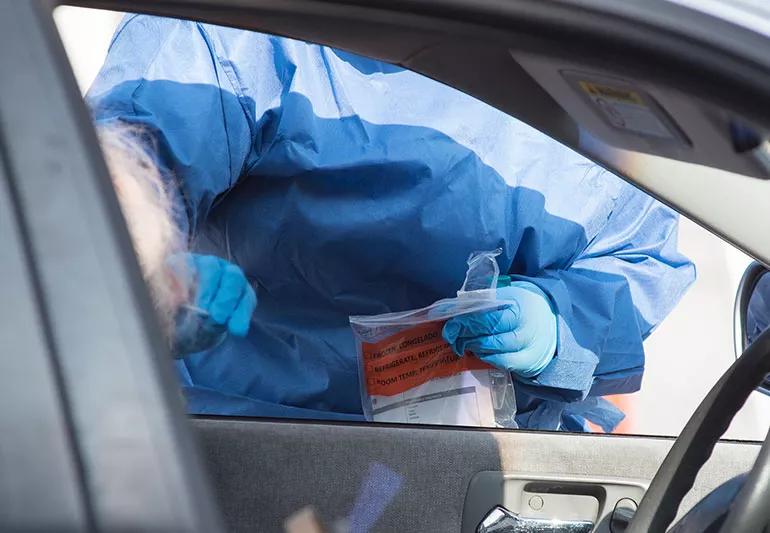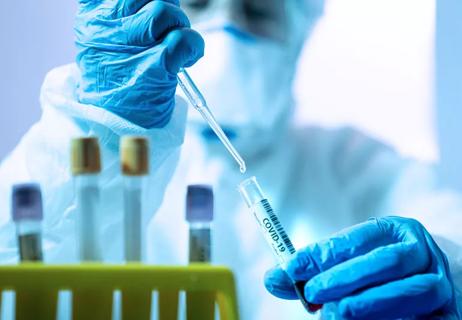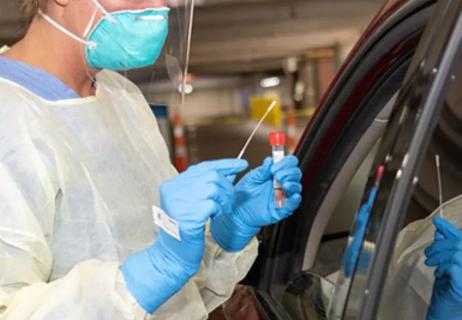Advertisement
Here's what to know and keep an eye out for

With the distribution of the COVID-19 vaccines growing every day, the number of COVID-19 tests being performed across the country has dropped. That trend has continued even as cases have slowly risen in recent weeks.
Advertisement
Cleveland Clinic is a non-profit academic medical center. Advertising on our site helps support our mission. We do not endorse non-Cleveland Clinic products or services. Policy
While the overall decrease in cases may seem like yet another sign we’re closing in on the end of the pandemic, there’s some reason for concern about the drop in tests, too. Pathologist Gary Procop, MD, explains why the drop in tests is happening, what it tells us about the pandemic and what to keep an eye out for.
The drop in tests is simple to explain: When COVID-19 cases are down, the need for testing is down, too. “Testing is usually performed because people have symptoms,” says Dr. Procop. “So the reason there are fewer COVID-19 tests is that there are fewer patients with COVID-19.”
That’s not to say there’s no need for testing anymore. “There’s still a need for diagnostic testing when someone has COVID-19 symptoms,” Dr. Procop says. “And while those numbers might be down, there’s still the need to screen other patients for COVID-19 for other reasons, like before surgery.”
Likewise, there’s also a need to keep up on protective guidelines, too, even with the rollout of vaccines. “We’re excited about the vaccine rollouts, but people can’t let up on the mitigation strategies, like social distancing, masking and good hand hygiene,” Dr. Procop notes.
He adds, “The big threat about lower cases and test numbers is that some people might think the pandemic is over and drop their guard. We don’t want a decrease in mitigation strategies or we’ll go into another wave.”
Advertisement
Along with maintaining those guidelines, it’s also important that appropriate testing continues. The most obvious reason is the need to diagnose positive cases to curb the spread, but there are additional reasons, too.
Besides the new routine at many healthcare facilities to test before surgeries and certain procedures to both protect healthcare providers and prevent the spread, COVID-19 screening is also important as we slowly return to halted activities.
“There are screenings for students returning to schools and, in some cases, returning to on-site jobs,” Dr. Procop points out. “You don’t want to do testing when it doesn’t make sense, but those are good examples of when it may.”
If a school or business plans to screen its students or employees, for example, it should have a well-thought-out strategy to handle false positives and false negatives.
With several prominent variants of the COVID-19 virus now identified throughout the United States, making sure there’s proper testing in place is very important.
Dr. Procop notes that the Federal Drug Administration (FDA) and companies that produce COVID-19 tests have addressed how these variants may affect test results. The good news, he adds, is that he’s confident that current tests will still correctly identify positive cases.
“Almost every available test on the market detects multiple, different genetic markers of the virus so that even if one part of the test misses one, the virus will be detected by another,” he says.
For instance, with one certain test, a marker is lost with the UK variant of the virus. “We’ve been able to use that as one way to monitor the spread of that variant in our communities,” he adds.
It still deserves close watching, though, as COVID-19 is an RNA virus and, Dr. Procop says, RNA viruses have a higher mutation rate than DNA viruses. Right now, the main focus is on how these variants respond to various vaccines and treatments.
Because of the rate of asymptomatic spread during the pandemic, there’s some concern about asymptomatic testing. But, Dr. Procop says, that, too, should be done only when it’s appropriate.
“You should be tested if you have symptoms of COVID-19. But, for asymptomatic individuals, it makes the most sense to test when they’ve been exposed,” he says.
Those asymptomatic individuals who are exposed are better candidates for testing, he says, so that they can be quarantined if they’re positive, curbing any chance they might spread the virus.
“With more schools returning to in-person learning and extracurricular activities, there’s more testing of asymptomatic individuals. Detection of individuals in these settings will assist in preventing outbreaks,” he says. “When there’s more close contact, early detection can help prevent spread from that group even further, to the greater community.”
Advertisement
While the success rates of the vaccines have been very high so far, there’s still a chance, no matter how small, that you could contract COVID-19 even after being vaccinated. “These vaccines are highly effective,” Dr. Procop notes, “but no vaccine is 100% effective.”
While it’s rare, there’s still a chance of infection, especially if you’ve only received one of the two doses required to be fully vaccinated with the Pfizer and Moderna vaccines. If you’ve been vaccinated and develop COVID-19 symptoms, contact your healthcare provider, Dr. Procop advises. “Your provider will be able to make that call as to whether or not testing is necessary,” he says.
In recent months, there has been an increase in at-home tests. While some allow you to collect your own specimen and send it to a lab, others now give you results at home within minutes.
The good news, Dr. Procop says, is that while laboratory tests (the kind you’d get at your healthcare provider’s office) are more sensitive than at-home tests, the at-home tests are still very reliable, particularly for patients with symptoms.
“The at-home tests have performed very well,” he says. “And if you’re sick and you can get a test delivered to your doorstep and find out if you’re COVID-19 positive or not without exposing anyone else, that’s a great option to have.”
Advertisement
The important thing to remember, Dr. Procop says, is that the pandemic isn’t over yet despite the drop in cases and tests. “There is a light at the end of the tunnel and there’s a great effort underway to get everyone vaccinated,” he says.
But he adds, “Don’t let down your guard, especially if you’re not vaccinated. Keep wearing your mask, washing your hands regularly and maintaining the proper social distance. If we can stay the course with this behavior, the end of the pandemic will come sooner rather than later.”
Advertisement
Learn more about our editorial process.
Advertisement

This at-home test for COVID-19 and flu can help you figure out what’s causing your symptoms, and how best to treat them

Above all, follow the package’s step-by-step instructions

Do you know the difference between a molecular test and antigen test for COVID-19?

Many questions, but few answers

You have all the symptoms, but here’s why you still might not get tested

If you have a weakened immune system, your risk for getting shingles a second or third time increases

Tetanus is easy to prevent but tough to treat — vaccines are your best defense

Germs spread quickly and easily, so covering your face, washing your hands and avoiding close contact are key

If you’re feeling short of breath, sleep can be tough — propping yourself up or sleeping on your side may help

If you fear the unknown or find yourself needing reassurance often, you may identify with this attachment style

If you’re looking to boost your gut health, it’s better to get fiber from whole foods